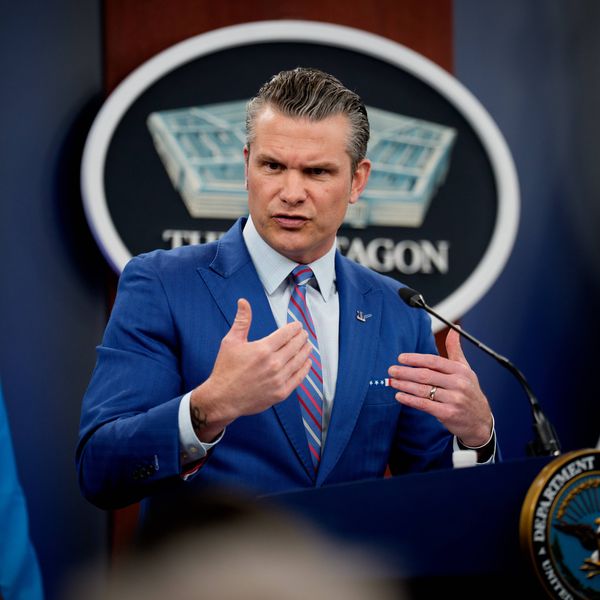Forget Air Force One, Pentagon Wastes Billions and Billions Every Month
President-elect Donald Trump's focus on single Boeing contract ignores enormous waste of bloated Pentagon budget
President-elect Donald Trump on Tuesday suggested that he would cancel what he claimed was a $4 billion Boeing contract to build a new fleet of Air Force One planes, saying he wanted the manufacturer to "make a lot of money, but not that much money."
Trump's comments came just after the Washington Post published a bombshell investigation showing the Pentagon had hidden a study which uncovered $125 billion in bureaucratic waste, fearing that Congress would cut defense funding if lawmakers found out.
The Post's Craig Whitlock and Bob Woodward reported:
Pentagon leaders had requested the study to help make their enormous back-office bureaucracy more efficient and reinvest any savings in combat power. But after the project documented far more wasteful spending than expected, senior defense officials moved swiftly to kill it by discrediting and suppressing the results.
The report, issued in January 2015, identified "a clear path" for the Defense Department to save $125 billion over five years. The plan would not have required layoffs of civil servants or reductions in military personnel. Instead, it would have streamlined the bureaucracy through attrition and early retirements, curtailed high-priced contractors and made better use of information technology.
"The cost-cutting study could find a receptive audience with President-elect Donald Trump," Whitlock and Woodward write. "He has promised a major military buildup and said he would pay for it by 'eliminating government waste and budget gimmicks.'"
But Trump's unpredictable temperament means it may be impossible to know if he will heed his own call. As the Guardian's Trevor Timm noted in an op-ed Tuesday, cutting government waste, including at the Pentagon, was Trump's "go-to cliche whenever someone asked him how he was going to pay for something he proposed...In fact, it's been the Republican party's mantra for years anytime they bring up the debt or the deficit."
"So Trump and his Republican colleagues want to get rid of 'waste,' there's literally never been a more giant and obvious example. Here's their time to act!" Timm wrote.
But, he continued, "It's unlikely that the Republicans will hold the Pentagon accountable for its free-spending ways even as they try to nickel and dime social programs. In the Republicans' fantasy world, the Pentagon's enormous budget is never a problem," adding:
Defense conglomerates and weapons makers fill the coffers of Republicans (and a lot of Democrats) each year, and spread large construction projects across virtually every state in the country, so lawmakers are loathe to cut funding for jobs in their respective districts. Add to that a hawkish tendency to support multiple wars around the world, and the Pentagon budget becomes virtually untouchable.
"Next time you hear Republicans complaining about food stamps for poor people, or calling for a reduction of social security benefits, or proposing to privatize Medicare, make sure to throw this report back in their face," Timm concluded. "Because whatever the waste problems in one government program or another, they pale in comparison to this."
An Urgent Message From Our Co-Founder
Dear Common Dreams reader, The U.S. is on a fast track to authoritarianism like nothing I've ever seen. Meanwhile, corporate news outlets are utterly capitulating to Trump, twisting their coverage to avoid drawing his ire while lining up to stuff cash in his pockets. That's why I believe that Common Dreams is doing the best and most consequential reporting that we've ever done. Our small but mighty team is a progressive reporting powerhouse, covering the news every day that the corporate media never will. Our mission has always been simple: To inform. To inspire. And to ignite change for the common good. Now here's the key piece that I want all our readers to understand: None of this would be possible without your financial support. That's not just some fundraising cliche. It's the absolute and literal truth. We don't accept corporate advertising and never will. We don't have a paywall because we don't think people should be blocked from critical news based on their ability to pay. Everything we do is funded by the donations of readers like you. Will you donate now to help power the nonprofit, independent reporting of Common Dreams? Thank you for being a vital member of our community. Together, we can keep independent journalism alive when it’s needed most. - Craig Brown, Co-founder |
President-elect Donald Trump on Tuesday suggested that he would cancel what he claimed was a $4 billion Boeing contract to build a new fleet of Air Force One planes, saying he wanted the manufacturer to "make a lot of money, but not that much money."
Trump's comments came just after the Washington Post published a bombshell investigation showing the Pentagon had hidden a study which uncovered $125 billion in bureaucratic waste, fearing that Congress would cut defense funding if lawmakers found out.
The Post's Craig Whitlock and Bob Woodward reported:
Pentagon leaders had requested the study to help make their enormous back-office bureaucracy more efficient and reinvest any savings in combat power. But after the project documented far more wasteful spending than expected, senior defense officials moved swiftly to kill it by discrediting and suppressing the results.
The report, issued in January 2015, identified "a clear path" for the Defense Department to save $125 billion over five years. The plan would not have required layoffs of civil servants or reductions in military personnel. Instead, it would have streamlined the bureaucracy through attrition and early retirements, curtailed high-priced contractors and made better use of information technology.
"The cost-cutting study could find a receptive audience with President-elect Donald Trump," Whitlock and Woodward write. "He has promised a major military buildup and said he would pay for it by 'eliminating government waste and budget gimmicks.'"
But Trump's unpredictable temperament means it may be impossible to know if he will heed his own call. As the Guardian's Trevor Timm noted in an op-ed Tuesday, cutting government waste, including at the Pentagon, was Trump's "go-to cliche whenever someone asked him how he was going to pay for something he proposed...In fact, it's been the Republican party's mantra for years anytime they bring up the debt or the deficit."
"So Trump and his Republican colleagues want to get rid of 'waste,' there's literally never been a more giant and obvious example. Here's their time to act!" Timm wrote.
But, he continued, "It's unlikely that the Republicans will hold the Pentagon accountable for its free-spending ways even as they try to nickel and dime social programs. In the Republicans' fantasy world, the Pentagon's enormous budget is never a problem," adding:
Defense conglomerates and weapons makers fill the coffers of Republicans (and a lot of Democrats) each year, and spread large construction projects across virtually every state in the country, so lawmakers are loathe to cut funding for jobs in their respective districts. Add to that a hawkish tendency to support multiple wars around the world, and the Pentagon budget becomes virtually untouchable.
"Next time you hear Republicans complaining about food stamps for poor people, or calling for a reduction of social security benefits, or proposing to privatize Medicare, make sure to throw this report back in their face," Timm concluded. "Because whatever the waste problems in one government program or another, they pale in comparison to this."
President-elect Donald Trump on Tuesday suggested that he would cancel what he claimed was a $4 billion Boeing contract to build a new fleet of Air Force One planes, saying he wanted the manufacturer to "make a lot of money, but not that much money."
Trump's comments came just after the Washington Post published a bombshell investigation showing the Pentagon had hidden a study which uncovered $125 billion in bureaucratic waste, fearing that Congress would cut defense funding if lawmakers found out.
The Post's Craig Whitlock and Bob Woodward reported:
Pentagon leaders had requested the study to help make their enormous back-office bureaucracy more efficient and reinvest any savings in combat power. But after the project documented far more wasteful spending than expected, senior defense officials moved swiftly to kill it by discrediting and suppressing the results.
The report, issued in January 2015, identified "a clear path" for the Defense Department to save $125 billion over five years. The plan would not have required layoffs of civil servants or reductions in military personnel. Instead, it would have streamlined the bureaucracy through attrition and early retirements, curtailed high-priced contractors and made better use of information technology.
"The cost-cutting study could find a receptive audience with President-elect Donald Trump," Whitlock and Woodward write. "He has promised a major military buildup and said he would pay for it by 'eliminating government waste and budget gimmicks.'"
But Trump's unpredictable temperament means it may be impossible to know if he will heed his own call. As the Guardian's Trevor Timm noted in an op-ed Tuesday, cutting government waste, including at the Pentagon, was Trump's "go-to cliche whenever someone asked him how he was going to pay for something he proposed...In fact, it's been the Republican party's mantra for years anytime they bring up the debt or the deficit."
"So Trump and his Republican colleagues want to get rid of 'waste,' there's literally never been a more giant and obvious example. Here's their time to act!" Timm wrote.
But, he continued, "It's unlikely that the Republicans will hold the Pentagon accountable for its free-spending ways even as they try to nickel and dime social programs. In the Republicans' fantasy world, the Pentagon's enormous budget is never a problem," adding:
Defense conglomerates and weapons makers fill the coffers of Republicans (and a lot of Democrats) each year, and spread large construction projects across virtually every state in the country, so lawmakers are loathe to cut funding for jobs in their respective districts. Add to that a hawkish tendency to support multiple wars around the world, and the Pentagon budget becomes virtually untouchable.
"Next time you hear Republicans complaining about food stamps for poor people, or calling for a reduction of social security benefits, or proposing to privatize Medicare, make sure to throw this report back in their face," Timm concluded. "Because whatever the waste problems in one government program or another, they pale in comparison to this."

